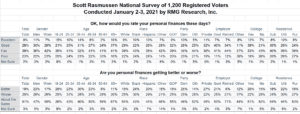Economic optimism declined as the new year arrived. A Scott Rasmussen national survey found that 19% of voters believe their personal finances are getting better. That’s down three points from a month ago and down eight since October.
Twenty-six percent (26%) believe their own finances are getting worse. That’s up just a single point compared to the pre-election survey.
The decline in optimism has been driven by Republicans. Prior to the election, 43% of GOP voters believed their finances were getting better. That fell to 36% after the election and 18% now. Such a partisan perspective is fairly normal following an election. Typically, Republicans are more upbeat about the economy when a Republican is in the White House, and Democrats are more optimistic when a Democrat is president.[1][2]
That decline has been partially offset by an increased confidence among Democrats. Twenty-five percent (25%) of those in President-elect Biden’s party now say their finances are getting better. That’s up seven points since Biden was elected.
Among Independent voters, 14% now say their finances are getting better while 28% say worse.
The survey also found that just 12% believe the overall economy is getting better while 51% say it’s getting worse.
Eighteen percent (18%) currently rate the economy as good or excellent while 37% say it’s in poor shape.
On the personal front, 37% say their own finances are good or excellent. Twenty-three percent (23%) say their finances are in poor shape.
Methodology
The online survey of 1,200 Registered Voters was conducted by Scott Rasmussen from January 2-3, 2021. Field work for the survey was conducted by RMG Research, Inc. Respondents were contacted online or via text. They were selected from a list of Registered Voters and through a process of Random Digital Engagement. Certain quotas were applied, and the sample was lightly weighted by geography, gender, age, race, education, and political party to reasonably reflect the nation’s population of Registered Voters. Other variables were reviewed to ensure that the final sample is representative of that population.



